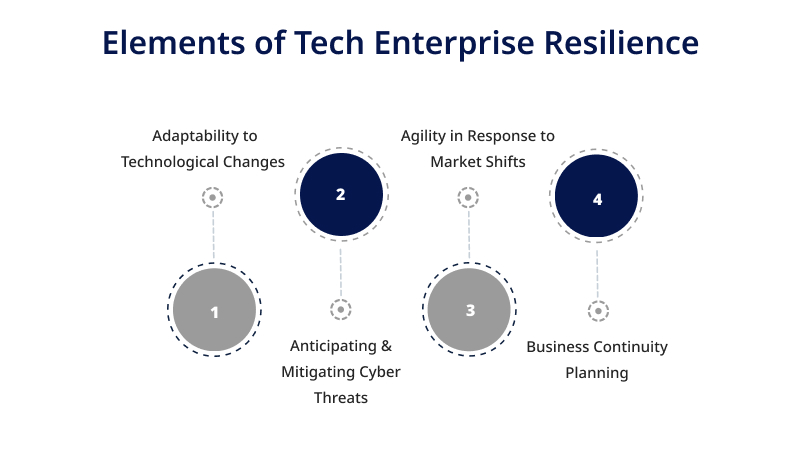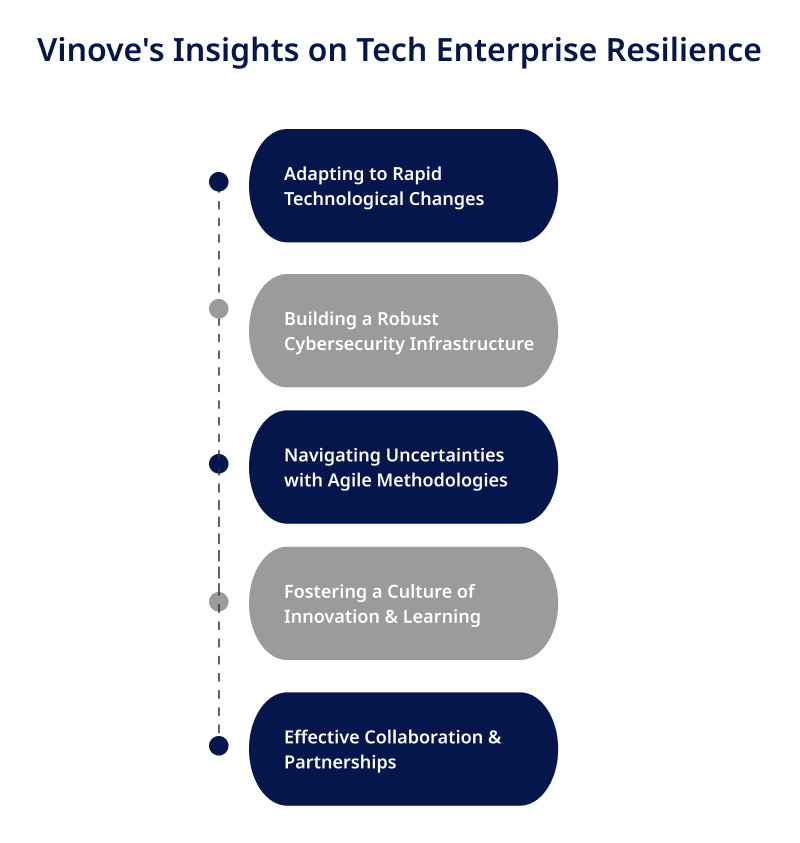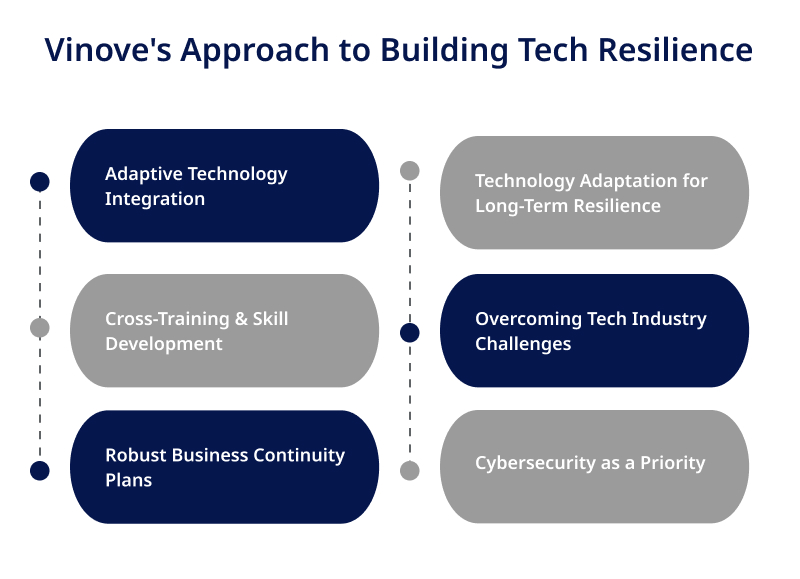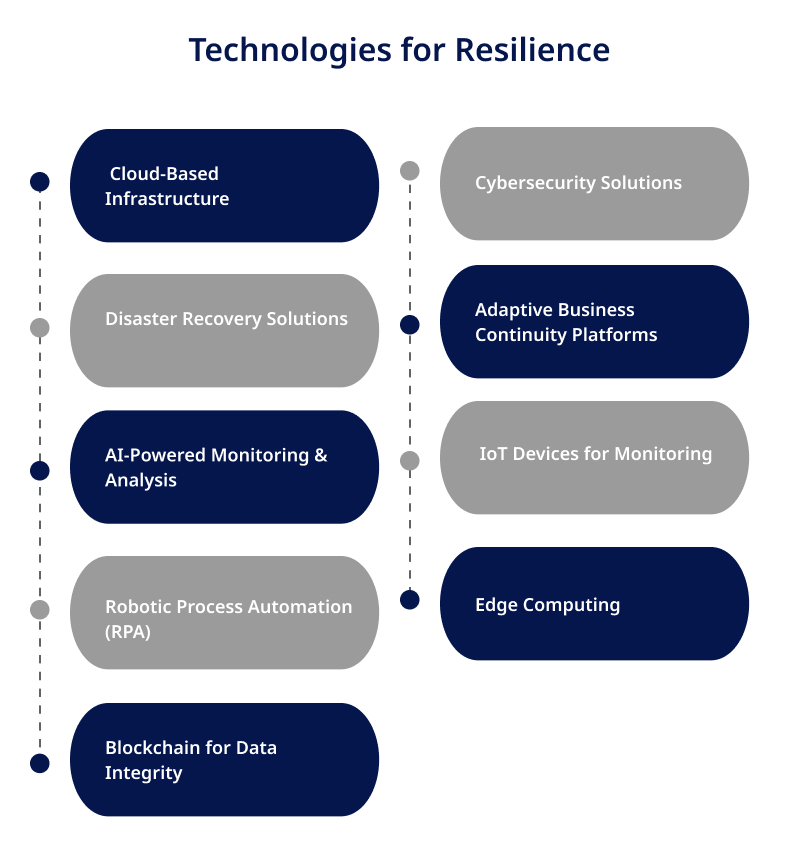Ever wondered how tech giants maintain their strength in the face of challenges?
Our exploration delves into Vinove’s resilience journey, revealing invaluable lessons for tech enthusiasts.
How do they navigate the ever-changing tech landscape?
Drawing from 17 years of tech prowess, Vinove offers insights into building resilience amid challenges.
Explore practical strategies and simple yet powerful lessons that can empower any tech enterprise to thrive in today’s dynamic and ever-evolving landscape.
Understanding Resilience in Tech
In the dynamic landscape of technology, resilience is the backbone of successful enterprises. Tech companies recognize the significance of navigating key challenges in enterprise software effectively.
Understanding resilience in the context of tech enterprises involves preparing for unforeseen disruptions and ensuring a smooth, continuous operation.
Key Elements of Tech Enterprise Resilience:
1. Adaptability to Technological Changes:
- Swift adaptation to emerging technologies is essential for tech resilience.
- This ensures a tech enterprise stays relevant and competitive despite rapid technological advancements.
2. Anticipating and Mitigating Cyber Threats:
- Cybersecurity is a critical component of tech enterprise resilience.
- Proactive measures to anticipate and mitigate cyber threats are essential to safeguard sensitive data and maintain operational continuity.
3. Agility in Response to Market Shifts:
- Resilient tech enterprises maintain agility to respond to market dynamics.
- The ability to pivot quickly in response to industry shifts ensures sustained success in a rapidly changing marketplace.
4. Business Continuity Planning:
- Ensuring seamless operations during disruptions is a hallmark of resilience.
- Robust business continuity planning is essential for minimizing downtime and maintaining customer trust.
Lessons from the Tech Frontier – Vinove’s Point of View
Vinove, with its rich history and tech expertise, offers valuable lessons on resilience. Each lesson is a testament to their journey in overcoming challenges and achieving sustained success.
Lesson 1: Adapting to Rapid Technological Changes
Adaptability is the cornerstone of resilience in the tech domain. Vinove’s journey underscores the importance of staying ahead in the ever-evolving tech landscape.
Key insights include:
- Continuous Learning: Embrace a culture of constant learning to keep pace with technological advancements.
- Flexibility in Strategy: Be willing to pivot strategies swiftly to align with emerging technologies.
- Employee Training: Invest in ongoing training programs to upskill employees and foster adaptability.
Lesson 2: Building a Robust Cybersecurity Infrastructure
In an era where data is a goldmine, Vinove emphasizes the critical role of cybersecurity in building resilience.
Key takeaways include:
- Proactive Threat Detection: Implement advanced detection systems to identify and neutralize potential cyber threats.
- Employee Cybersecurity Training: Educate and empower employees to recognize and mitigate cyber risks.
- Regular Security Audits: Conduct regular cybersecurity audits to ensure the robustness of your infrastructure.
Lesson 3: Navigating Uncertainties with Agile Methodologies
Uncertainty is a constant in the tech world. Vinove’s success story highlights the effectiveness of agile methodologies in navigating uncertainties.
Key aspects include:
- Iterative Development: Embrace an iterative approach to development, allowing for adjustments based on changing requirements.
- Cross-functional collaboration: Foster collaboration between teams to enhance adaptability and responsiveness.
- Feedback Loops: Establish continuous feedback loops to address challenges and optimize processes quickly.
Lesson 4: Fostering a Culture of Innovation and Learning
Innovation is a driving force behind resilience. Vinove’s commitment to fostering a culture of innovation and learning has been pivotal.
Key insights include:
- Encouraging Creativity: Create an environment that encourages employees to think creatively and propose innovative solutions.
- Learning from Failures: Treat failures as learning opportunities, encouraging a growth mindset within the organization.
- Investing in R&D: Allocate resources to research and development to stay ahead of digital transformation trends.
Lesson 5: Collaboration and Partnerships
Vinove recognizes the power of collaboration in building resilience. Strategic partnerships and collaborative efforts amplify strengths.
Key lessons include:
- Strategic Alliances: Forge alliances with like-minded organizations to pool resources and expertise.
- Shared Learning: Collaborate with industry peers for shared learning and insights.
- Ecosystem Integration: Integrate with the broader tech ecosystem to leverage collective strengths.
Strategies for Building Tech Resilience
In the unpredictable terrain of the tech industry, resilience isn’t just an asset; it’s a strategic imperative.
Vinove, with its rich experience, offers valuable insights into implementing resilience strategies that can turn challenges into triumphs.
This success in navigating the ever-evolving tech landscape is attributed to effective strategies tailored for tech enterprise resilience.
1. Adaptive Technology Integration
Vinove’s Approach: Embracing new technologies promptly.
Benefits:
- Vinove’s quick adoption of new technologies ensures swift responses to market changes.
- Incorporating technological advancements enhances operational efficiency, keeping Vinove ahead in the tech game.
2. Cross-Training and Skill Development
Vinove’s Approach: Encouraging cross-functional skill development.
Benefits:
- By fostering cross-functional skills, Vinove ensures teams are versatile and ready to tackle various challenges.
- Vinove’s emphasis on skill development reduces dependencies on specific skill sets, enhancing flexibility and adaptability.
3. Robust Business Continuity Plans
Vinove’s Approach: Developing comprehensive continuity plans.
Benefits:
- Vinove’s well-structured plans minimize downtime during unforeseen disruptions, ensuring continuous operations.
- Clear guidelines enable Vinove to recover swiftly from unexpected challenges, maintaining business continuity seamlessly.
4. Technology Adaptation for Long-Term Resilience
Vinove’s Approach: Regularly scanning the tech landscape for emerging trends.
Benefits:
- Proactive scanning allows Vinove to anticipate future challenges and opportunities, staying ahead of the curve.
- Staying informed ensures Vinove remains ahead of the competition, offering cutting-edge solutions to clients.
5. Overcoming Tech Industry Challenges
Vinove’s Approach: Embracing agile methodologies.
Benefits:
- Vinove’s adoption of agile methodologies enables faster responses to changing project requirements.
- Agile methodologies foster improved collaboration and communication, enhancing overall project efficiency.
6. Cybersecurity as a Priority
Vinove’s Approach: Elevating cybersecurity measures.
Benefits:
- Elevating cybersecurity measures ensures Vinove safeguards sensitive data, contributing to business continuity.
- Prioritizing cybersecurity builds trust with clients and stakeholders, establishing Vinove as a reliable and secure tech partner.
Tools and Technologies for Resilience
In the fast-paced realm of tech enterprise resilience, leveraging cutting-edge tools and technologies is paramount.
Here’s a comprehensive look at the arsenal of solutions that contribute to building and sustaining resilience in technology companies:
1. Cloud-Based Infrastructure
In the age of tech resilience, cloud-based infrastructure stands as a pillar, offering scalability, flexibility, and robust data management capabilities.
Capabilities:
- Scalability: Adaptable to varying workloads, ensuring seamless operations during peak times.
- Flexibility: Enables quick adjustments to resources based on business needs.
- Data Security: Robust security measures to safeguard against cyber threats.
2. Disaster Recovery Solutions
Tech enterprises face unforeseen challenges, and disaster recovery solutions are instrumental in ensuring business continuity.
Capabilities:
- Automated Backup: Regularly backs up critical data to prevent loss during disruptions.
- Rapid Recovery: Minimizes downtime by swiftly restoring systems after an incident.
- Replication: Ensures redundancy, allowing for swift shifts to backup systems.
3. AI-Powered Monitoring and Analysis
Artificial Intelligence is pivotal in proactive monitoring and analysis, anticipating issues before they impact operations.
Capabilities:
- Predictive Analytics: Forecasts potential issues based on historical data and patterns.
- Automated Alerts: Instant notifications for anomalies, enabling quick responses.
- Performance Optimization: Continuous monitoring for optimal system performance.
4. Cybersecurity Solutions
In the ever-evolving landscape of cyber threats, robust cybersecurity solutions are non-negotiable for tech enterprises.
Capabilities:
- Firewalls and Antivirus: Standard defenses against malware and unauthorized access.
- Intrusion Detection Systems (IDS): Real-time monitoring for potential security breaches.
- Encryption Tools: Safeguards sensitive data, ensuring confidentiality.
5. Adaptive Business Continuity Platforms
Adaptable business continuity platforms are essential for tech resilience, ensuring operations continue seamlessly during disruptions.
Capabilities:
- Scenario Planning: Allows businesses to prepare for various disruption scenarios.
- Resource Allocation: Efficient allocation of resources for optimal continuity.
- Collaborative Tools: Facilitates communication and coordination during crises.
6. IoT Devices for Monitoring
Internet of Things (IoT) devices contribute to resilience by providing real-time data on infrastructure and operational health.
Capabilities:
- Infrastructure Monitoring: Tracks the health of hardware and network components.
- Environmental Monitoring: Monitors conditions such as temperature and humidity.
- Predictive Maintenance: Identifies potential issues before they escalate.
7. Collaboration and Communication Platforms
Efficient communication is integral to resilience. Collaboration platforms enhance connectivity among teams.
Capabilities:
- Real-Time Communication: Instant messaging and video conferencing for swift collaboration.
- Document Sharing: Seamless sharing and updating of critical documents.
- Task Management: Facilitates organized task allocation and tracking.
8. Robotic Process Automation (RPA)
RPA streamlines routine tasks, enhancing efficiency and allowing human resources to focus on critical aspects during challenging times.
Capabilities:
- Process Efficiency: Automates repetitive tasks, reducing manual workload.
- Error Reduction: Minimizes human errors in routine operations.
- Adaptability: Easily customizable for evolving business needs.
9. Edge Computing
In pursuing tech resilience, edge computing brings computation closer to data sources, ensuring swift processing and reduced latency.
Capabilities:
- Reduced Latency: Faster processing by minimizing data travel distances.
- Bandwidth Optimization: Reduces strain on central servers by processing data locally.
- Enhanced Security: Limits data exposure by processing sensitive information locally.
10. Blockchain for Data Integrity
Blockchain technology contributes to resilience by ensuring the integrity and immutability of critical data.
Capabilities:
- Data Immutability: Once recorded, data cannot be altered.
- Decentralization: Distributed ledger for enhanced security and transparency.
- Smart Contracts: Self-executing contracts ensuring automated and secure processes.
Key Takeaways
Vinove’s experiences serve as a guiding light for tech enterprises aiming to fortify their operations.
By embracing adaptive infrastructure, cutting-edge cybersecurity, and advanced collaboration tools, businesses can overcome hurdles and thrive amidst uncertainties.
The lessons from Vinove underscore that resilience is not just a response to adversity; it’s a proactive strategy for sustainable success in the dynamic realm of technology. As tech enterprises build resilience, they pave the way for innovation, growth, and enduring industry impact.





